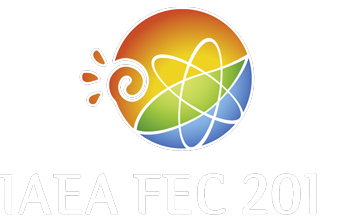Speaker
Prof.
Nikolay Kargin
(NRNU MEPHI)
Description
The testing experiments of the Hall sensors based on the gold nanofilms have been carried out in Joint Institute for Nuclear Research in Dubna at the JBR-2 research nuclear reactor in May 2015
The special test instrumentation has been developed to provide the investigation up to the high neutron fluences. The instrumentation permits to provide on-line measurements of the sensor parameters under irradiation in the nuclear reactors channels. The neutron energy spectrum in this reactor was similar to the assumed one for the steady-state sensors locations in ITER reactor.
Earlier it was shown that the III-V semiconductor-based Hall sensors are successfully functioning under the ITER-relevant conditions of reactor neutron irradiation as high as the fluence 2·10^18 n·cm^-2. Stable long-term operation of the sensors was also demonstrated in a JET reactor during the 5-year period.
The neutron fluence achieved in this experiment on the testing of the gold sensors was 10 times greater and approximately equals 2·10^19 n·cm^-2, the neutron flux – 1.5·10^13 n·cm^-2/s, the irradiation temperature – 140°С.
The experiment showed that the sensors sensitivity to the magnetic field was practically unchanged for the all range of the researched fluences. Such great radiation stability of the golden sensors under the high fluences, which essentially exceeds the neutron fluences achieved in the ITER reactor during its life time (approximately 20 years), makes these sensors very useful for DEMO scale reactors of the next generation.
| Country or International Organization | Russia |
|---|---|
| Paper Number | PDP-18 |
Author
Prof.
Nikolay Kargin
(NRNU MEPHI)
Co-authors
Mr
Alexander Vasyliev
(Magnetic Sensor Laboratory, Lviv Polytechnic National University)
Dr
Fedir Shurygin
(Magnetic Sensor Laboratory, Lviv Polytechnic National University)
Dr
Inessa Bolshakova
(Magnetic Sensor Laboratory, Lviv Polytechnic National University)
Dr
Ivan Vasil'evskii
(National Research Nuclear University MEPHI)
Mr
Maxim Bulavin
(Joint Institute for Nuclear Research)
Prof.
Mikhail Strikhanov
(National Research Nuclear University MEPHI)
Dr
Sergey Kulikov
(Joint Institute for Nuclear Research)
Prof.
Thomas Kuech
(University of Wisconsin-Madison)
Dr
Yaroslav Kost
(Magnetic Sensor Laboratory, Lviv Polytechnic National University)

